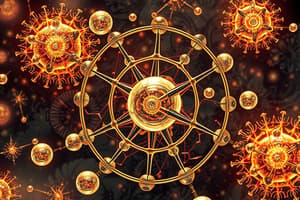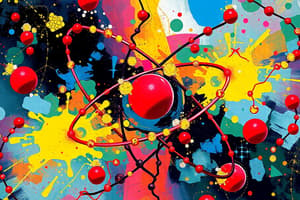Podcast
Questions and Answers
Which subatomic particle has a positive charge?
Which subatomic particle has a positive charge?
- Electron
- Valence electron
- Proton (correct)
- Neutron
Which subatomic particle has a charge of -1?
Which subatomic particle has a charge of -1?
- Proton
- Electron (correct)
- Neutron
- Valence electron
What is the atomic number of carbon?
What is the atomic number of carbon?
- 2
- 8
- 6 (correct)
- 12
What type of bond is formed when two atoms share valence electrons?
What type of bond is formed when two atoms share valence electrons?
What are atoms called when they have lost or gained electrons?
What are atoms called when they have lost or gained electrons?
Which term describes the state where attractive forces between atoms hold them together at a particular distance from each other and in a particular configuration?
Which term describes the state where attractive forces between atoms hold them together at a particular distance from each other and in a particular configuration?
What is a compound?
What is a compound?
Which statement about elements is correct?
Which statement about elements is correct?
What is rust made of?
What is rust made of?
How many known elements are there currently?
How many known elements are there currently?
Which of the following is true about ionic bonds?
Which of the following is true about ionic bonds?
What force holds ionic compounds together?
What force holds ionic compounds together?
Which of the following is an example of an ionic compound?
Which of the following is an example of an ionic compound?
How are cations formed?
How are cations formed?
What happens when an atom gains electrons?
What happens when an atom gains electrons?
Flashcards are hidden until you start studying




